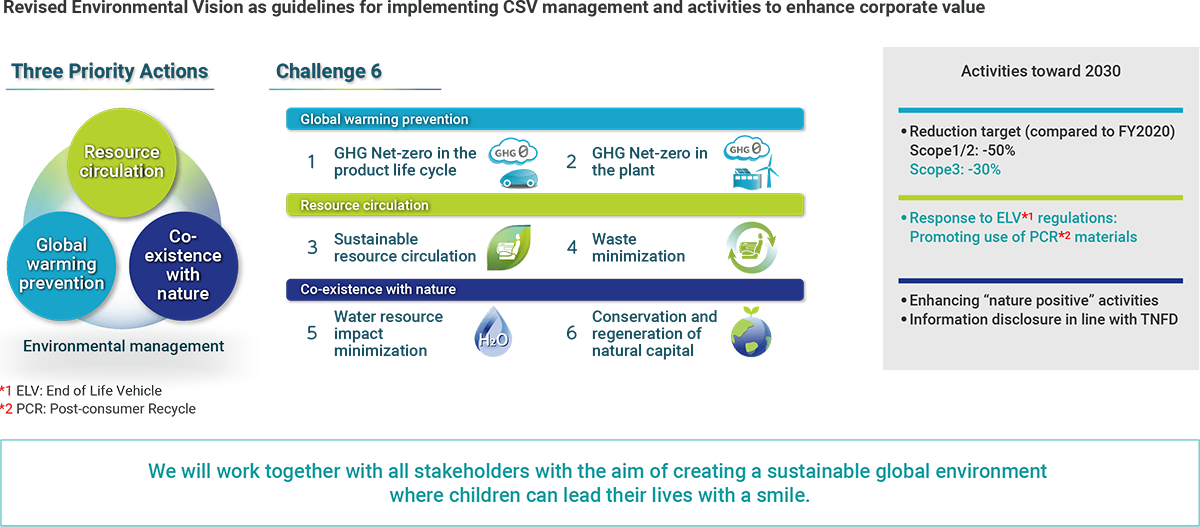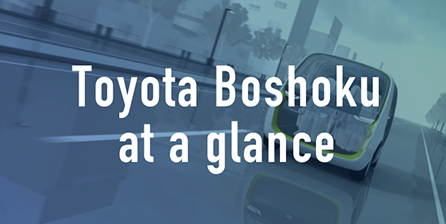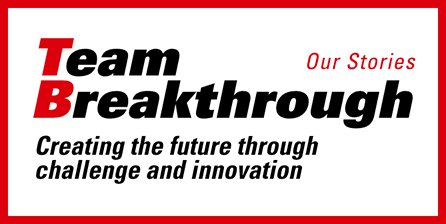Mid-Term Business Plan
Presentation Slides and Movies
2030 Environmental Recognition (macro, mobility industry)
The following changes in the business environment are expected in 2030.
- Transformation of automobile market due to entry from different industries in line with the advancement of battery EV and MaaS.
- The growing influence of Z/α generations, who are digital natives and diversification of user needs due to increase in the elderly population.
- Co-existence with nature taking into consideration not only decarbonization and circular economy but also the nature positive movement.
- Diversity in working people coming from the concept of diversity and inclusion, declining birthrate and aging population.
Based on this environmental recognition, the value of enjoying the time inside vehicles will increase and the vehicle interior space will become a key differentiating factor. We believe that this will lead to the rising customer expectations for “comfortable vehicle interior space based on safety and environment-friendliness.”
We have worked to become the Interior Space Creator as our desired status in the future. We see this as a big chance for further growth in “comfortable vehicle interior space based on safety and environment-friendliness.”

Framework of 2030 Mid-term Business Plan
Our 2030 Target is to “become a company as the Interior Space Creator realizes comfortable mobile spaces and contributes in solving social issues while expanding product range and customer base.
In addition to the changes in the environment surrounding mobility,
our strengths,
- The technology development capabilities for "Products closest to users".
- Ability to deliver bulky products globally just in time.
- Abundant global human resources.
We will make use of such things.
Financial targets are set to be 2,200 billion yen for revenue, 150 billion yen for operating profit, and 7% for operating profit ratio.
While maintaining a steady share in each market, we aim to achieve an operating profit ratio far exceeding the past record.
In terms of shareholder returns, we have introduced "DOE" as a new indicator and will work to stably achieve at least 3%.
We have also reviewed the ESG KPIs as our non-financial targets for 2030.
The representative indicators are as follows.

Aiming to achieve the Target, by implementing the CSV management, which pursues both social value and economic value by resolving social issues through business operations, we aim to enhance our corporate value.
For example, with medical vehicles and mobility independence support, we will contribute to solving social issues and thereby create new businesses as the Interior Space Creator.
Inheriting our founding spirit of “for the world and for people,” we aim to grow stably by making steady efforts to be helpful for society and link such efforts to our businesses.

Environmental Vision
We revised our Environmental Vision as guidelines for implementing CSV management and activities to enhance our corporate value.
We will accelerate and promote efforts to respond to environmental requirements that society asks for companies, advance information disclosure, respond to ELV regulations, and preserve/restore natural capital.
We revised our Environmental Vision.
Our priority actions in three categories
- Global warming prevention
- Resource circulation
- Co-existence with nature
Reestablishment of Challenge 6
- ”Global warming prevention”
Along with the 50% reduction for Scope 1 and 2, we aim for 30% reduction for Scope 3. - ”Resource circulation”
Achieving the use rate of recycled plastics demanded by customers. - ”Co-existence with nature”
Enhancing the activities for conservation of ecosystems for a nature-positive world, and advancing information disclosure in accordance with the TNFD.

Business Portfolio Policy
The Toyota Boshoku group sets our Vision, which describes the company we aim to become by considering the Principles of Toyoda, which bring together the ideas of the founder Sakichi Toyoda, and our Corporate Philosophy, which was established based on the it. This Vision advocates, “looking into the future, we will create tomorrow’s automobile interior spaces that will inspire our customers the world over.”
We defined the Toyota Boshoku group’s materiality, the identification of important issues to be resolved through our business operations from among a variety of social issues and the approach we adopt to resolve them with the goal of enhancing corporate value.
To increase corporate value, we have formulated a materiality plan to identify and resolve important issues that the Toyota Boshoku group prioritizes through its core business from among various social issues.
In fiscal 2024, we announced our 2030 Medium-term Business Plan, which defines our target as to "Become a company as the Interior Space Creator, which Contributes in solving social issues while expanding product range and customer base".
As the Interior Space Creator, we will expand our product fields and develop products that are compatible with electrification. In addition to existing customers, we will acquire new customers such as new OEM and MaaS servicers. Furthermore, we are looking to maximize cash flow through enhancement of revenue and through improvements in manufacturing productivity. We aim to achieve the goals of our Mid-Term Business Plan through strategic allocation of the management resources gained from MONOZUKURI.
We have set FY2031 financial target and aim to realize revenue of 2.2 trillion yen, operating profit of 150 billion yen plus alpha (an operating profit ratio of 7%), and ROE of 10 % or higher.
With regard to returns to shareholders, while balancing medium-to long-term growth and financial soundness, we will introduce a new DOE with the aim of maintaining long-term stable dividends that are not greatly influenced by immediate business performance. We aim to achieve a DOE of 3% or more, while also taking into consideration the level of the dividend payout ratio.
In order to manage business risks, we have adopted the business evaluation metric with an awareness of capital costs (IRRs that take into account the cost of capital by country). This allows us to objectively monitor business feasibility and its result will be reflected on discussion for formulation of action plans and examination of business continuity.
We will increase the added value of seats and interior/exterior as a whole interior space, while strategically allocating management resources to the growth areas of electrified products and new business development toward 2030.






